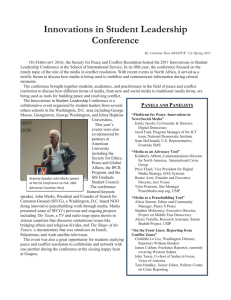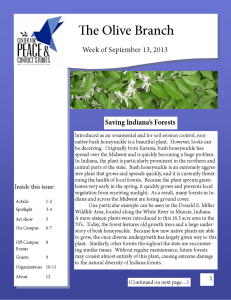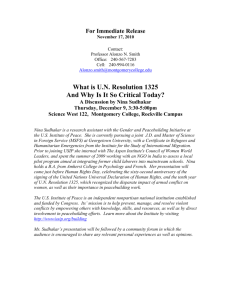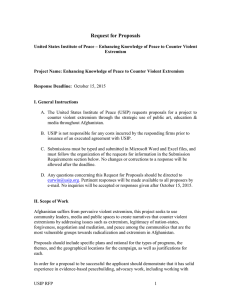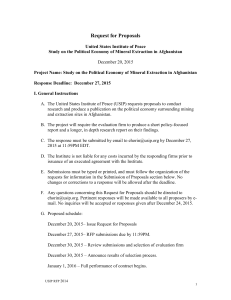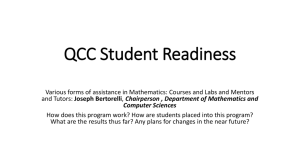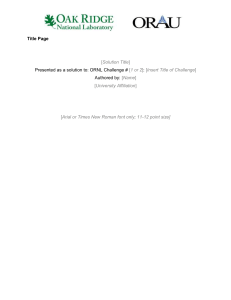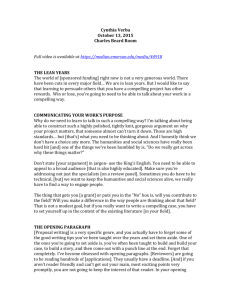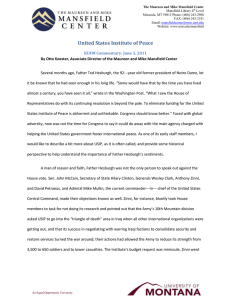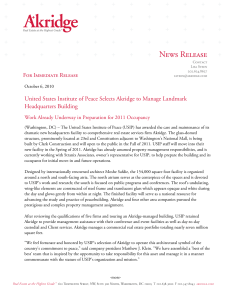C S P
advertisement
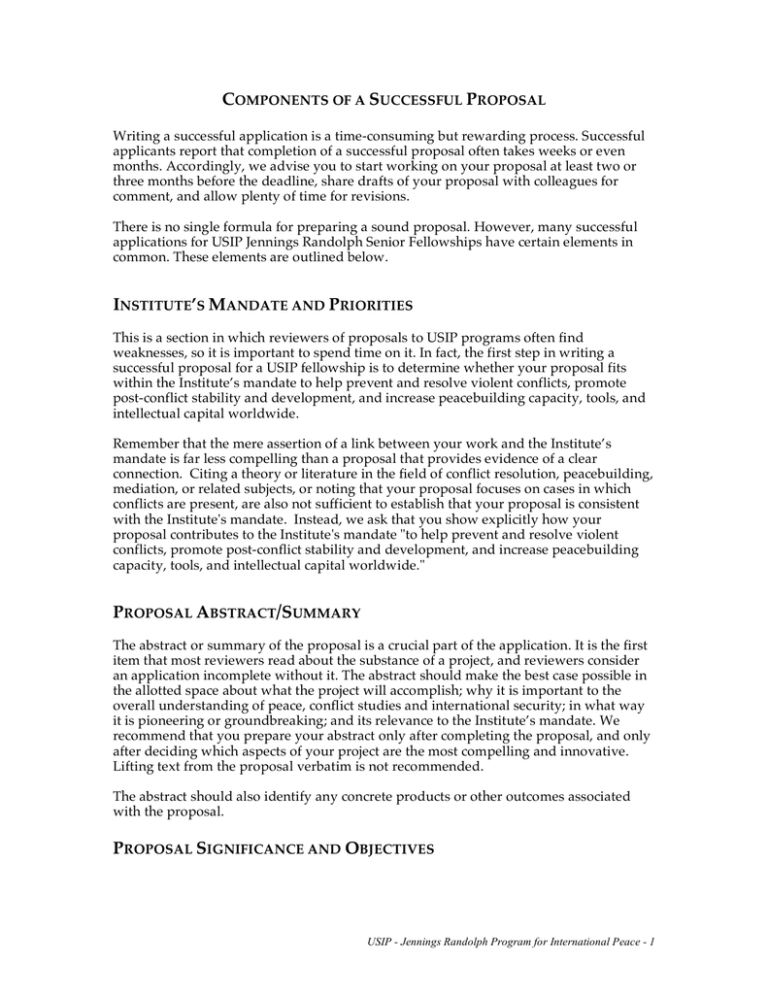
COMPONENTS OF A SUCCESSFUL PROPOSAL Writing a successful application is a time-consuming but rewarding process. Successful applicants report that completion of a successful proposal often takes weeks or even months. Accordingly, we advise you to start working on your proposal at least two or three months before the deadline, share drafts of your proposal with colleagues for comment, and allow plenty of time for revisions. There is no single formula for preparing a sound proposal. However, many successful applications for USIP Jennings Randolph Senior Fellowships have certain elements in common. These elements are outlined below. INSTITUTE’S MANDATE AND PRIORITIES This is a section in which reviewers of proposals to USIP programs often find weaknesses, so it is important to spend time on it. In fact, the first step in writing a successful proposal for a USIP fellowship is to determine whether your proposal fits within the Institute’s mandate to help prevent and resolve violent conflicts, promote post-conflict stability and development, and increase peacebuilding capacity, tools, and intellectual capital worldwide. Remember that the mere assertion of a link between your work and the Institute’s mandate is far less compelling than a proposal that provides evidence of a clear connection. Citing a theory or literature in the field of conflict resolution, peacebuilding, mediation, or related subjects, or noting that your proposal focuses on cases in which conflicts are present, are also not sufficient to establish that your proposal is consistent with the Institute's mandate. Instead, we ask that you show explicitly how your proposal contributes to the Institute's mandate "to help prevent and resolve violent conflicts, promote post-conflict stability and development, and increase peacebuilding capacity, tools, and intellectual capital worldwide." PROPOSAL ABSTRACT/SUMMARY The abstract or summary of the proposal is a crucial part of the application. It is the first item that most reviewers read about the substance of a project, and reviewers consider an application incomplete without it. The abstract should make the best case possible in the allotted space about what the project will accomplish; why it is important to the overall understanding of peace, conflict studies and international security; in what way it is pioneering or groundbreaking; and its relevance to the Institute’s mandate. We recommend that you prepare your abstract only after completing the proposal, and only after deciding which aspects of your project are the most compelling and innovative. Lifting text from the proposal verbatim is not recommended. The abstract should also identify any concrete products or other outcomes associated with the proposal. PROPOSAL SIGNIFICANCE AND OBJECTIVES USIP - Jennings Randolph Program for International Peace - 1 You should set the stage by describing the questions, problems or needs that your project will address and the larger context within which these issues have relevance. What issues will you address and how will the project generate new knowledge? What conclusions do you expect to draw from your research, and why are they significant? Be concrete and offer examples. Your proposal will be stronger if you specify precisely what questions you will pose in your project than if you propose, for example, “to examine the relationship between ethnic violence and economic competition among ethnic groups.” Proposals must include a review of the relevant literature or practice on the subject and should make clear how the questions you are researching are similar to or different from those addressed in the existing literature or in current practice. Does your project fill an important gap or challenge conventional wisdom and findings in the existing literature? Your proposal may also include a bibliography that demonstrates your familiarity with the relevant literature on your topic. RESEARCH METHODOLOGY AND PROJECT DESIGN Your proposal should outline clearly and precisely how you will undertake your project. This section is often the most challenging for applicants. Done properly, it demonstrates that you are ready to implement your project because you have considered the necessary steps to answer the questions outlined in the previous section of your proposal. RESEARCH QUESTIONS, METHODS OF INQUIRY, SOURCES OF INFORMATION: These are some of the questions your methodology section should answer: what is the analytical framework within which the research will be conducted? What specific research methods will you use to examine the evidence and arrive at conclusions? Why is the methodology appropriate for addressing the issues raised in your proposal? What information sources—documents, personal interviews, newspaper articles, surveys, participant observation, databases—will you gather, compile, or generate to answer the research questions you are posing? Reviewers will find research projects that involve genuine inquiry more compelling than ones in which the researcher has already drawn the conclusions and is unprepared to consider and accept unexpected conclusions and alternative explanations. Any indication that an applicant has already pre-judged the outcome of his/her research, or is only searching for evidence to confirm initial assumptions, will give rise to concerns about the value of the proposed research. USE OF JARGON: Scholars seeking research support will want to refer to the methodologies specific to their disciplines while avoiding the use of jargon that may confound reviewers trained in other fields. If you intend to apply a specialized, technical or quantitative methodology, it is imperative to provide evidence that you can communicate your findings in a clear and meaningful fashion to an intelligent lay audience. PROJECT FEASIBILITY: Reviewers will make judgments about whether the methodology you have proposed is appropriate and feasible, and whether you have identified information sources that will help you find the answers to your research questions. They will also look for evidence that you have access to those sources. If you are planning to conduct interviews or undertake survey research, it may be appropriate to describe the key questions you will ask and how the answers are likely to shed light on your research hypotheses. You may also want to describe whether you anticipate any problems gaining access to those you want to interview and how you plan to overcome such problems. USIP - Jennings Randolph Program for International Peace - 2 JUSTIFICATION OF CASE STUDIES: Often, research is based on case studies. It is important to describe how and why you have selected certain cases and not others, and how the focus on those particular cases might influence the findings. PROJECT SCHEDULE, PRODUCTS AND LIKELIHOOD OF COMPLETION: Other questions reviewers will look for answers to in your proposal include: How much of the project work, if any, will you have already completed by the start of the award, and how much remains to be completed? Can you complete the project during the term of the award? Does your project require special skills—such as knowledge of a foreign language or quantitative skills—that you possess? Does this research build upon research you have already undertaken? What other qualifications do you bring to the project, including evidence of ability to carry out and complete projects like the one you are proposing? Which audience(s) do you aim to reach through your work, and is the product (or products) you propose feasible and appropriate for these audiences? *** Finally, when in residence, Fellows contribute to the collegial life of the Institute by presenting their work and participating in workshops, conferences, and other events. The Institute relies on Senior Fellows to provide in-house expertise via the media and other public forums. In these ways Fellows play a major role in the Institute’s mission of promoting research and public education on the peaceful resolution of international conflict. See also: USIP website http://www.usip.org/fellows/apply.html See also: Adam Przeworski and Frank Salomon, “The Art of Writing Proposals,” at http://fellowships.ssrc.org/art_of_writing_proposals/ USIP - Jennings Randolph Program for International Peace - 3
